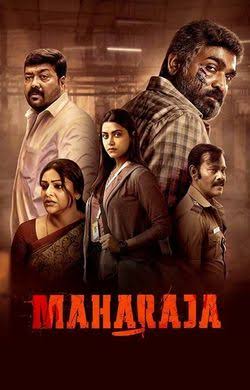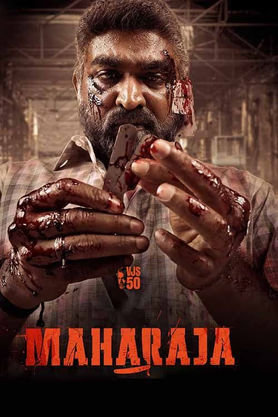Maharaja (2024) movie review: Vijay Sethupathi shines in this emotional thriller filled with suspense, powerful acting, and a gripping storyline.



Maharaja (2024) – Full Movie Review
Introduction
Maharaja (2024) is a Tamil-language action thriller that marks the 50th film of the acclaimed actor Vijay Sethupathi. Directed by Nithilan Swaminathan, known for his earlier hit Kurangu Bommai, the film promises a gritty, grounded thriller with emotional depth and intense performances. With a strong supporting cast, a gripping storyline, and a well-balanced blend of action and sentiment, Maharaja showcases Vijay Sethupathi in one of his most powerful roles to date.
Plot Summary
Maharaja follows the story of a seemingly ordinary barber named Maharaja (played by Vijay Sethupathi), who lives a modest life with his daughter. His world is turned upside down when he files a police complaint claiming that “Lakshmi” has been stolen from his house. However, the twist lies in the ambiguity of what or who Lakshmi is – the film keeps this mystery alive for a significant portion of the narrative.
As the investigation unfolds, the police and the audience alike are left puzzled by Maharaja’s cryptic and intense behavior. It soon becomes clear that there is a painful past behind this theft, connected to a larger, darker truth involving crime, loss, and vengeance. As Maharaja’s true intentions come to light, the film moves from a suspense-driven mystery to an emotionally charged tale of justice and retribution.
Performances
Vijay Sethupathi delivers a powerhouse performance, effortlessly transitioning between vulnerability, grief, and cold-blooded resolve. His portrayal of a father haunted by the past and driven by justice is layered and deeply compelling. The subtle mannerisms, measured dialogue delivery, and emotional depth elevate the character of Maharaja into one of his finest roles in recent years.
The supporting cast, including Anurag Kashyap, Mamta Mohandas, Abhirami, and Natarajan Subramaniam, all contribute effectively to the narrative. Anurag Kashyap’s presence adds an intense and gritty flavor to the film, even though his screen time is limited. Mamta Mohandas, in a more subdued role, brings emotional balance, and the child actor playing Maharaja’s daughter adds poignancy to the plot.
Direction and Screenplay
Director Nithilan Swaminathan’s strength lies in his ability to craft emotionally rich thrillers grounded in realism. He handles Maharaja with maturity, avoiding melodrama and instead building a slow-burning narrative that gradually reveals its layers. The screenplay is non-linear, moving between past and present, and while it demands attention from the viewer, it pays off with satisfying twists and a powerful climax.
The film is structured in a way that keeps the audience constantly guessing. What seems like a simple tale of theft becomes a deeply personal story about loss, love, and revenge. The mystery surrounding “Lakshmi” is particularly well-executed, maintaining suspense while building emotional weight.
Themes and Symbolism
Maharaja explores themes of fatherhood, justice, trauma, and redemption. The emotional core of the film lies in the bond between a father and his daughter, and the lengths a man would go to protect and avenge that relationship. The idea of what “Lakshmi” represents serves as a symbolic anchor throughout the film – it’s not just about an object or a person, but a symbol of everything the protagonist has lost and is fighting to reclaim.
The film also touches on systemic failure, especially how the justice system treats ordinary people. Maharaja’s interactions with the police and the indifference he faces reflect the struggles of the common man, adding a layer of social commentary to the film.
Cinematography and Music
Dinesh Purushothaman’s cinematography is gritty and atmospheric, perfectly matching the tone of the film. The muted color palette and realistic lighting give Maharaja a raw, immersive quality. The visual storytelling is strong, especially in scenes depicting Maharaja’s quiet despair and explosive rage.
Ajaneesh Loknath’s music and background score are another highlight. The score is minimal when needed and intensifies during key emotional or action moments. The soundtrack doesn’t overpower but complements the narrative, especially during the film’s climactic sequences.
Editing and Pacing
While the film’s pacing is deliberately slow in the first half, it picks up significantly in the second. The editing by Philomin Raj keeps the nonlinear narrative coherent, though some viewers may find the early portions slightly confusing due to the mystery element. However, once the central conflict becomes clear, the film’s momentum carries it through to a gripping and emotional finale.
Final Verdict
Maharaja is not just a revenge thriller; it is an emotionally intense story with heart and purpose. Vijay Sethupathi’s performance anchors the film, supported by solid direction, a strong screenplay, and technical finesse. The film may not appeal to those expecting a fast-paced commercial entertainer, but for viewers looking for a story with emotional depth, mystery, and powerful performances, Maharaja delivers in spades.
Rating: 4.5/5
Pros:
- Brilliant performance by Vijay Sethupathi
- Gripping screenplay with emotional depth
- Strong direction and cinematography
- Effective background score
Cons:
- Slightly slow-paced in the first half
- Requires attentive viewing due to nonlinear narrative
Maharaja (2024) is a must-watch for fans of intense, meaningful cinema that balances thrill with heart.